Background: Stress, Fatigue, and Digestive Struggles
This 36-year-old mother of two was feeling overwhelmed and exhausted. As a full-time freight audit lead working from home with small children, she faced a high level of chronic stress. Despite her regular CrossFit workouts and seemingly healthy lifestyle, she was plagued by weight gain, low libido, mood swings, digestive issues, and unrelenting fatigue. After extensive lab work, including a Hair Tissue Mineral Analysis (HTMA) and gut health testing, the underlying issues came into sharper focus.
Here’s a deeper look into her health challenges and the recommendations that helped her regain her vitality.
Root Causes: Mineral Imbalances and Digestive Dysfunction ?
Her HTMA revealed several critical imbalances that explained many of her symptoms. One of the most notable issues was extremely high sodium-to-potassium (Na/K) ratio, indicating acute stress and inflammation. This ratio often correlated with irritability, anger, and emotional volatility, which explained her frequent feelings of “mom rage.”
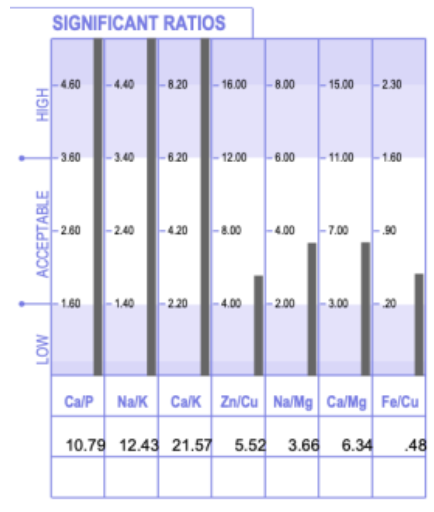
Her sluggish digestion, poor appetite, and post-meal bloating were rooted in low hydrochloric acid (HCl) production, as evidenced by low phosphorus levels and imbalances in zinc, copper, and manganese. These minerals played key roles in enzyme production and protein synthesis, and their deficiencies or excesses were directly linked to her gut health and metabolic function.
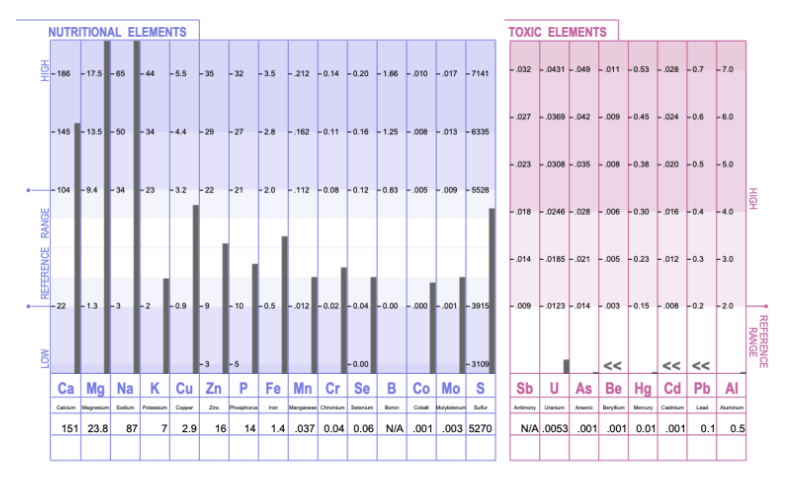
In addition, her elevated copper levels suggested copper toxicity, which contributed to her skin issues (acne), emotional instability, and poor immune function. Copper, while essential for yeast control, became bio-unavailable, leading to yeast overgrowth and infections. Elevated copper also depleted zinc, which was necessary for fighting infections and maintaining a strong immune system.
The Gut Factor: Candida, H. Pylori, and Dysbiosis ?
Her gut health test revealed even more layers to her story. Candida overgrowth, H. pylori, and an imbalance of gut flora were all present, further explaining her digestive symptoms and skin problems. Candida and H. pylori are notorious for causing chronic bloating, fatigue, and sugar cravings. H. pylori, if left untreated, could have led to more severe gastrointestinal issues like ulcers, while Candida overgrowth contributed to symptoms such as brain fog, digestive upset, and fungal infections.
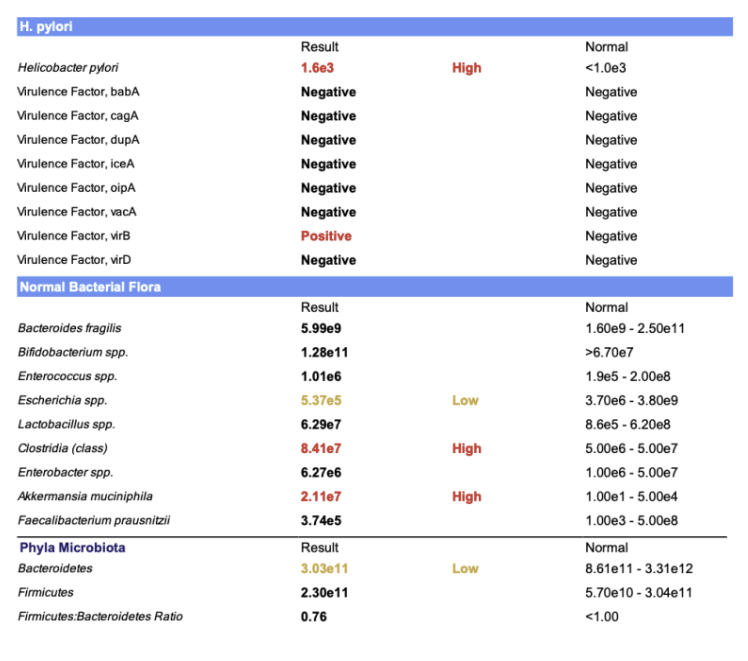
Her gut test also showed imbalances in her normal flora, with elevated levels of Clostridium and Enterococcus, indicating reduced digestive function. Clostridium overgrowth contributed to inflammation and dysbiosis, while Enterococcus, often linked with low stomach acid, pointed to a compromised digestive system. Furthermore, high levels of Prevotella and other opportunistic bacteria suggested ongoing gut inflammation, contributing to her symptoms of gas, bloating, and abdominal discomfort.
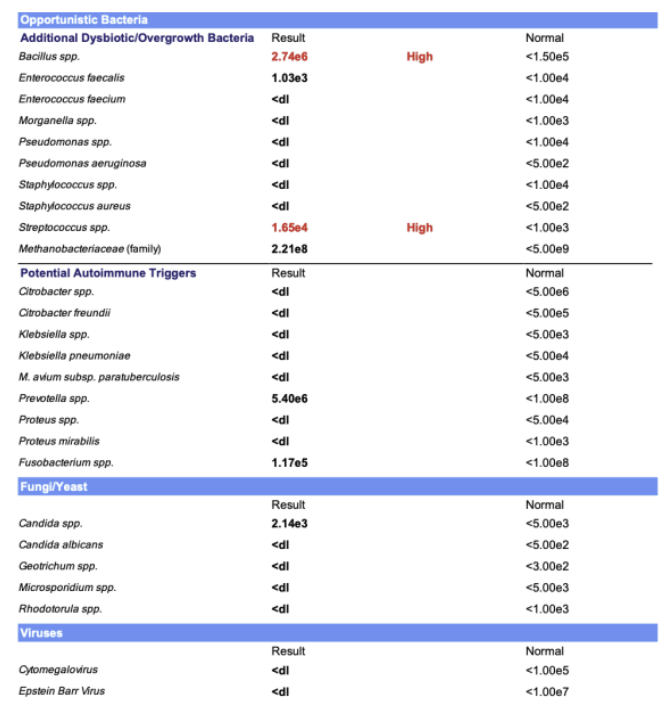
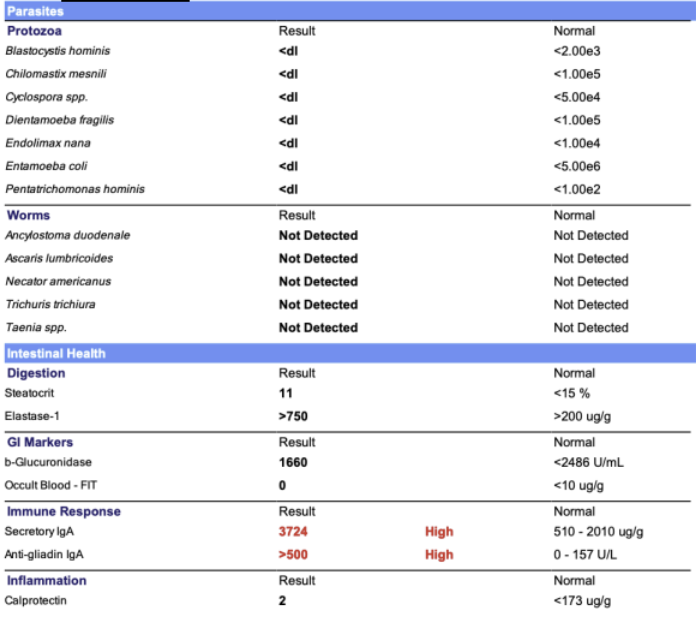
Hormonal Imbalances: Thyroid, Adrenal Fatigue, and Estrogen Dominance
Hormonal imbalances were a key factor in her health challenges. Her low potassium levels indicated a sluggish thyroid, which explained her cold hands, feet, and difficulty losing weight. Her history of using hormonal birth control likely contributed to estrogen dominance, which manifested as weight gain, mood swings, low libido, and slow metabolism. Clear signs of adrenal fatigue were present, with high sodium retention and chronic potassium loss pointing to overworked adrenal glands. Adrenal dysregulation often led to low energy, difficulty waking up, and intense sugar cravings, all of which she had been experiencing.
Recommendations: A Comprehensive Path to Healing ?
Addressing her health issues required a multi-layered approach. Here’s the targeted plan that helped her restore balance and vitality.
1. Digestive Support and Healing
To improve digestion and nutrient absorption:
- Gastrazyme: For mucosal healing in the upper GI, 2 capsules per meal.
- Beta-TCP: To support fat digestion, 1 capsule per meal.
- MegaSpore Probiotic: Titrated up to 2 per day to restore gut flora balance.
- GI Resolve: Further supported gut lining healing.
Before introducing eradicating agents for Candida and H. pylori, it was crucial to heal her digestive tract to better tolerate these interventions.
2. H. Pylori and Candida Protocol
To address the gut infections, a 12-week protocol included:
- Bio-HPF: 3 capsules 3x/day to target H. pylori.
- Mastica: 3 capsules 2x/day for additional H. pylori support.
- Monolaurin-Avail: 2 capsules 2x/day for its antiviral and antimicrobial properties.
- ParaMicrocidin: 1 capsule 3x/day to combat Candida.
- Interface Plus: 1 capsule 2x/day to break down biofilms protecting the yeast.
3. Anti-Fungal and Anti-Inflammatory Diet
For 12 weeks (and up to 6 months depending on retest), she followed an anti-fungal diet:
- A Paleo-style diet that allowed for butter and ghee.
- Limited starchy carbohydrates and fruits to reduce sugar intake, to help starve Candida.
- This dietary approach also aligned with her HTMA findings, focusing on balancing blood sugar and reducing inflammation.
4. Support for Adrenals and Hormones
To address adrenal fatigue and hormone imbalances:
- She implemented stress management techniques such as mindfulness, gentle yoga, and breathwork.
- Mineral rebalancing with potassium, magnesium, and zinc supplements was introduced.
- She reduced high-intensity CrossFit sessions temporarily to allow her adrenals to recover.
5. Mineral Replenishment and Detox Support
To address the copper toxicity and other mineral imbalances:
- Zinc and selenium supplementation helps detox excess copper and supports immune function.
- Molybdenum regulates copper levels and assists in detoxification.
- Selenium supports thyroid health and the conversion of T4 to T3, the active thyroid hormone.
Conclusion: A Path to Restored Vitality ?
This 36-year-old woman’s journey highlights the complexities of stress, hormonal imbalances, and gut health in overall well-being. By addressing her mineral deficiencies, digestive dysfunction, and adrenal fatigue, she was able to regain her energy, balance her mood, and restore her vitality. With a comprehensive, phased approach, she experienced significant improvements in her energy, digestion, and overall health in the months that followed.






